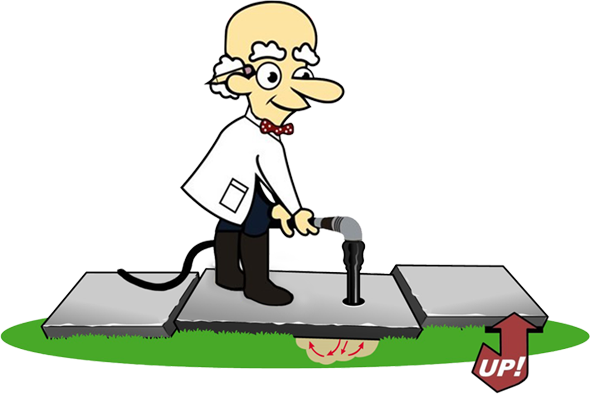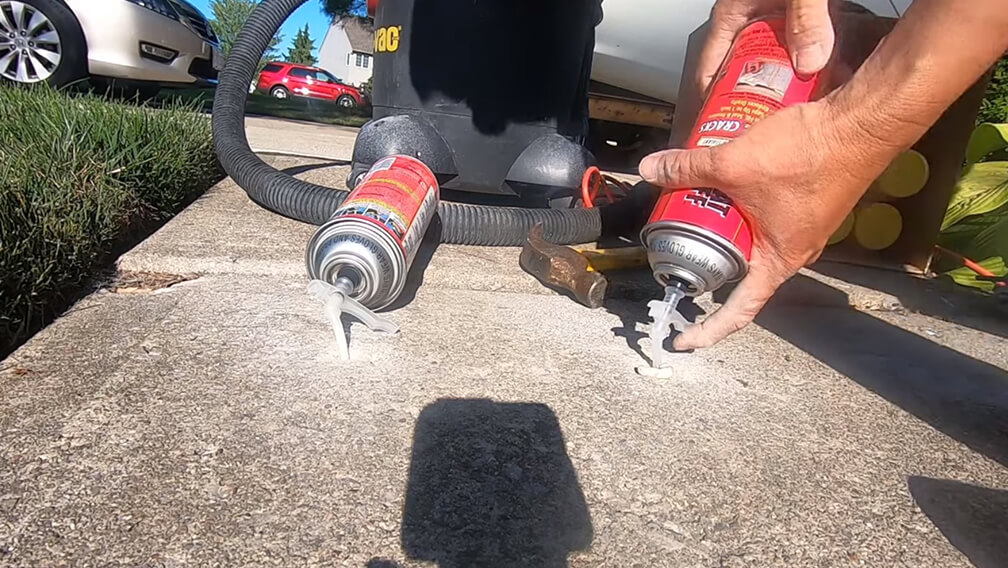IN THIS ARTICLE
Can you use spray foam to fix a sunken or uneven concrete slab? While this may seem simple and cost-effective, you should know a few things before attempting to use DIY concrete lifting foam to correct settled concrete. This article will discuss the effectiveness and safety of canned spray foam for concrete lifting.
What is Concrete Lifting?
Before diving into DIY concrete lifting foam, let’s first understand what concrete lifting is. Concrete lifting, also known as slabjacking or mudjacking, raises a sunken concrete slab back to its original position. To lift a concrete slab, holes are drilled and a mixture of cement, sand, and water is pumped underneath it. Concrete Chiropractor uses the concrete lifting process for slabs that are in good condition to avoid costly concrete replacement.
Can Canned Spray Foam Lift Concrete?
DIY foam leveling to lift concrete is not common, nor do we recommend a DIY approach to lifting your concrete. Here are some popular DIY methods that we have found on the internet:
Concrete lifting foam DIY Drill and Fill Video
In this FriendnFamily channels video, they drill holes into the concrete slab and then inject spray foam into the concrete. While the spray foam raises the concrete sidewalk slab and lifts the nearby walkway slab. This happens because the foam expanded too much.
Lifting Concrete with a Jack and Foam
In Your Home Solutions USA’s video, they first build a more complicated concrete jacking device with wood, chains, C clamps, and two car jacks.
Once suspended, cement brick, wood wedges, and foam are installed at the two outer edges.
The video’s second portion shows the sidewalk length and sinking concrete entry steps. Despite enhancements, a trip hazard still exists at the sidewalk’s termination.
Problems With Using DIY Spray Foam for Concrete Lifting
Foam spray cans have expanding foam for insulation, sealing, and filling gaps, not for lifting concrete. While this foam can expand and harden, it may not provide sufficient strength.
Experts generally do not recommend using canned spray foam for DIY concrete leveling for several reasons. Spray foam can expand and harden, but it may not be strong enough for concrete leveling that lasts. Additionally, there are other issues to consider:
- Inadequate Support: Canned spray foam may not provide support lifting and leveling heavy concrete slabs. It lacks the strength needed to bear the weight of the concrete over time.
- Over-Lifting and Damage: Polyurethane foam lifts concrete through expansion, and over-lifting a concrete slab is irreversible. This is a possibility even for minimally trained professionals who use the Polyjacking process. DIY concrete lifting makes it easy to miss-calculate when injecting the foam, causing the slab to rise too high. Cracking or damage to the slab can also occur.
- Moisture Issues: Some spray foams may be sensitive to moisture and using them in contact with wet or damp concrete could compromise their effectiveness.
- A Mess and Staining: The expansion of the chemical foam can be messy and hard to control. Foam can stick to concrete surfaces. siding or surrounding areas, leaving yellowing stains that can be difficult to remove, leaving you with permanent damage.
- Cracking: Spray foam will also require the use of jacks or bars to raise the concrete. This increases the chances of cracking the concrete slab.
- Slabs Can Get Stuck Together: Concrete lifting professionals often have to saw-cut slabs, so they do not stick to each other, crack, or rise together. This important step can be difficult for the DIYer as it requires the proper equipment now owned by most homeowners.
- Safety Risk: Lifting heavy concrete slabs with wood and bottle jacks can be risky. Wear proper safety equipment and be always aware of the placement of your feet and hands when lifting the slab.
For DIY concrete leveling projects, it’s advisable to use more appropriate methods such as:
- Mudjacking or Slabjacking: This involves injecting a mixture of sand, water, and cement beneath the concrete slab to raise and level it. It’s a more reliable method but typically requires professional equipment.
- Self-Leveling Concrete: For inside floors, this specialized concrete mix is designed to flow and level itself, making it suitable for thin applications to correct uneven surfaces.
- Sidewalk Grinding: This method involves using a grinder with diamond blades to grind down the concrete. This is not a preferred method when appearance is a concern, as the process leaves an aggregate finish and color difference.
- Cement Patching: A specialty cement repair product is troweled onto the concrete surface to compensate for unevenness in the concrete slabs. The number one concern with cement patching is delamination or failure.
Should you DIY Concrete Lifting With Foam?
Although canned spray foam may seem like a quick and easy DIY solution for concrete lifting, experts do not recommend it. It is not strong enough to lift concrete and can cause further damage. Spray foam cans are designed for insulation and sealing purposes, not concrete lifting. They have their limitations and can be difficult to use properly.
For safety and efficiency, it is recommended to hire a professional concrete lifting service. They have the necessary equipment and expertise to accurately level your concrete slab. Ensuring that you lift your concrete slab properly guarantees a long-lasting solution.
Here at Concrete Chiropractor, we are seasoned experts in providing concrete lifting services. Click the link below to contact our team of professionals for your free evaluation!
Click Here to Contact Your Nearest Location to Receive a FREE Evaluation
Learn more about concrete lifting foam methods with these articles from Our Concrete Chiropractor® informational Learning Center.
Is Concrete Lifting Foam A Good Idea?
What Causes Concrete Settlement: ANd How You Can Fix It
- Garage Floor Raising and Coating: The Ultimate Guide - June 4, 2024
- Mudjacking Cost: 5 Factors That Affect It - April 10, 2024
- What is The Average Cost of Concrete Leveling in Belle Mead, NJ? - April 4, 2024



